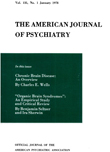Psychological sequelae of brain damage in children
Abstract
The author reviews the empirical evidence on the psychological sequelae of brain damage in childhood, concluding that brain injury causes a markedly increased risk in both intellectual impairment and psychiatric disorder. The risk is related to the severity of the brain damage, but there is little indication of locus effects. Psychiatric disorder is probably most likely to occur when there is abnormal neurophysiological activity; to some extent it may be influenced by the nature of the basic medical condition. Psychiatric consequences of brain injury are also substantially affected by the child's pre-injury behavior, psychosocial circumstances, and cognitive level. However, there are few psychological sequelae that are specific to brain damage.
Access content
To read the fulltext, please use one of the options below to sign in or purchase access.- Personal login
- Institutional Login
- Sign in via OpenAthens
- Register for access
-
Please login/register if you wish to pair your device and check access availability.
Not a subscriber?
PsychiatryOnline subscription options offer access to the DSM-5 library, books, journals, CME, and patient resources. This all-in-one virtual library provides psychiatrists and mental health professionals with key resources for diagnosis, treatment, research, and professional development.
Need more help? PsychiatryOnline Customer Service may be reached by emailing [email protected] or by calling 800-368-5777 (in the U.S.) or 703-907-7322 (outside the U.S.).



